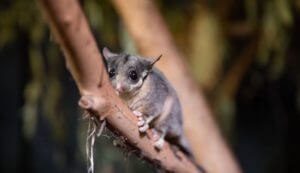 New Melbourne University research finds it's bushfires, not timber harvesting which is the biggest threat to the endangered Leadbeater's Possum. Photo: Zoos Victoria.
New Melbourne University research finds it's bushfires, not timber harvesting which is the biggest threat to the endangered Leadbeater's Possum. Photo: Zoos Victoria.
A new study by leading landscape scientists at the University of Melbourne has shown that forestry operations would reduce the Leadbeater's Possum habitat by just 1.4% – 2.3% if it continued for the next 250 years.
Furthermore the study found that, whilst harvesting an area reduces foraging and nesting habitat, that foraging habitat returns within 10 to 15 years and can be recolonised by Leadbeater's Possums as long as there are nesting sites nearby. The report published in The Conversation can be found here.
The Chief Executive Officer of the Australian Forest Products Association (AFPA) Ross Hampton said, "This important study finally proves that the very modest amount of native timber harvesting in Victoria - about 4 trees out of every 10,000 - is entirely compatible with sound, sustainable, environmental management. Under Victorian laws every small area which will be harvested is carefully surveyed for native species and protections put in place before operations. After timber harvesting is completed, the area is reseeded and regenerated which means, as the researchers found, it very quickly becomes suitable habitat again."
"The researchers also found that the biggest threats by far to the Leadbeater's Possum were bushfires and climate change. They found that ultimately to protect threatened species such as the Leadbeater's Possum, Victoria should move away from site-specific conservation, which the state has followed till now."
The research says: "This approach is doomed to fail in dynamic landscapes - particularly in fire-prone landscapes in a warming climate. For conservation planning to be successful, we need co-ordinated forest, fire and conservation management that accounts for these dynamics across the whole landscape, not just in individual locations."
Mr Hampton said, "This is exactly what AFPA has been calling for. We have asked the national Bushfire Royal Commission to provide recommendations on moving this nation to a 'whole of landscape' fire management approach. It is a recipe for more disastrous outcomes like the Black Summer bushfires if we continue to compartmentalise our fire management. The men and women and machines which can do this work for our communities are in our forestry workforce. It beggars belief that Premier Andrews is insisting that this workforce depart the bush, even as we consider how to avoid a repeat of the past tragic summer."
"This University of Melbourne study provides more evidence that the Andrew's Government's decision to take an axe to the native forestry sector in that state is ill-considered and has not considered all the ramifications. It doesn't make sense in terms of mitigating the fire risk for all Victorians, it doesn't make sense in terms of closing down regional jobs and, this study even now shows, it makes no sense when it comes to protecting the state's faunal emblem, the Leadbeater's Possum. The decision should be reversed," concluded Mr Hampton.
Original media release: Media Release – LEADING SCIENTISTS STUDY INTO LEADBEATER'S POSSUM PROVES ANDREWS WRONG TO CLOSE DOWN NATIVE FORESTRY






